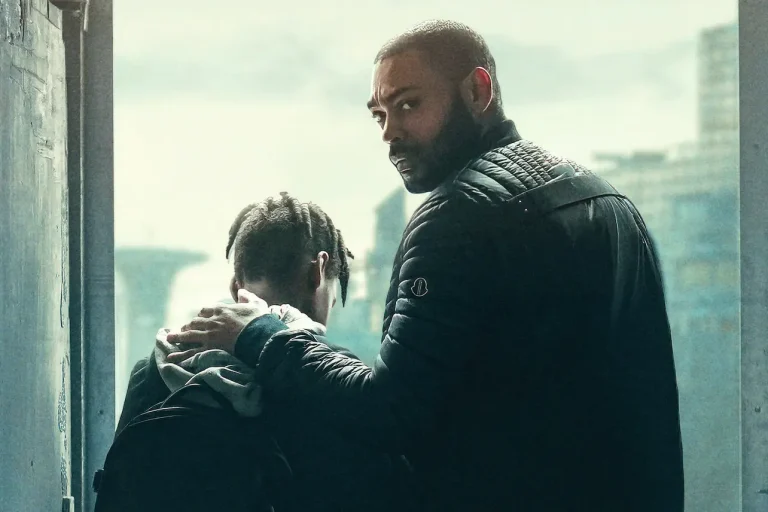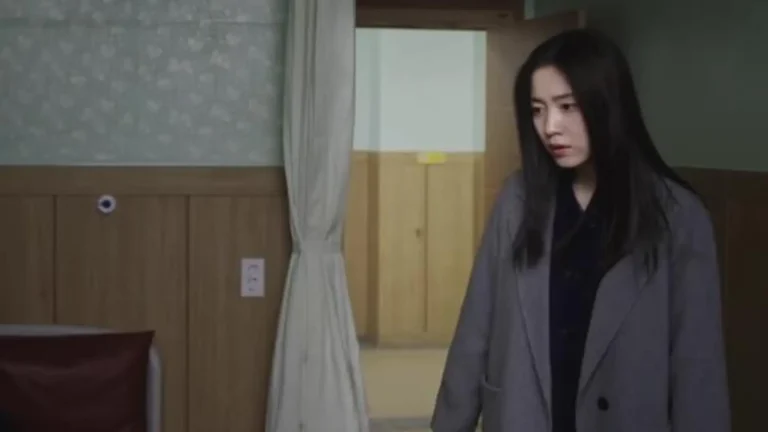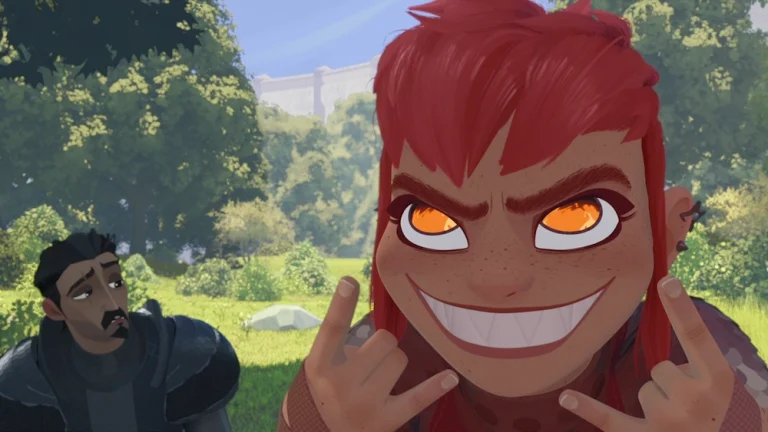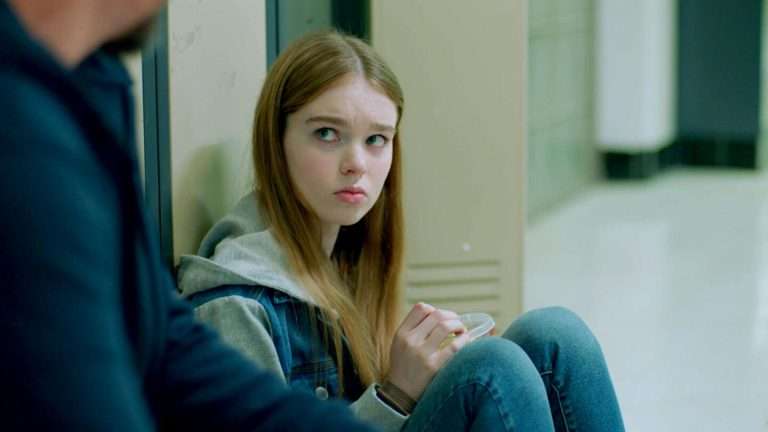‘R.M.N.’ is a Romanian film written and directed by Christina Mungiu. Before its release on AMC+, it premiered in competition at the 2022 Cannes Film Festival. The critically acclaimed filmmaker, known widely for the harrowing 4 Months, 3 Weeks, and 2 Days, now tackles the themes of xenophobia, racism, and masculinity in this new film. Based on the 2020 Ditrau xenophobic incident, the film follows a man who returns to Germany to meet his ex-lover and tackles his conflicting thoughts about her decision to hire two foreigners in her bakery.
The director chose the film’s title after a Romanian acronym for nuclear magnetic resonance as an allegory to the ‘brain scan trying to detect things below the surface.’ The slow-burn drama explores its subjects with a subtle approach and leaves us with several things to ponder upon. If you are conflicted about its plot points and their meaning, keep reading.
*Spoilers Ahead*
R.M.N. (2022) Plot Summary & Movie Synopsis:
Matthias’ Return
R.M.N. follows Matthias (Marin Grigore), ethnically Romanian, who lives in Germany for work. We get a look at his professional life, where he becomes incredibly hostile towards a co-worker for a trivial reason. After his outburst, he suddenly decides to travel back to his hometown of Transylvania. His wife, Ana (Macrina Bârlădeanu), gives him a cold welcome. We quickly realize that the couple is not on good terms. He takes offense to their son Rudi (Mark Blenyesi) refusing to speak at all, still sleeping next to Ana, and needing company on his way to school. Ana’s behavior around Matthias conveys his ever-controlling behavior.
Nevertheless, the next morning, Matthias walks Rudi to school and shouts at a passerby lurking in the woods. He assumes this is why Rudi fears walking alone. Since Rudi speaks no word, he cannot know for sure. At the school, Matthias notices Rudi being bullied for his meekness and feels personally offended by their insults. Right after, the reverend asks him to visit his place to slaughter a pig. His trust in Matthias’ butchering skills becomes evident. On his way back, he meets his ex-lover, Csilla (Judith State), who runs a local bakery with Mrs Dénes (Orsolya Moldován).
The Crisis of Employment
At the time, the two women were struggling to find additional employees in a short time to work at their bakery. If they could find some, it could help them get an EU grant. Since the locals choose to work abroad instead of for their bakery, they can think of no other option but look for eager foreigners. As a result, they put out an ad to point out the overtime pay for professional, experienced bakers but omit the actual salary details. Since Matthias comes there after years, Csilla asks him if he would be interested to work. The only catch is – they can offer only a minimal wage.
While Matthias does not accept the offer, he learns about Csilla’s divorce from Tánczo two years ago. After that, she moved into her parent’s house and now works as a boss at the bakery. Suddenly, Matthias’ concern for Rudi takes a backseat because of his rekindled interest in Csilla. Besides them, he has another conflict to deal with. His father, Papa Otto (Andrei Finti), is seriously ill and needs someone’s constant attention, even for basic needs. While the local doctor advises taking Otto to a neurologist, he does not have any diagnosis for Rudi’s refusal to speak. His father’s ailment may have been the reason that he left the country to work somewhere else. Ana’s anger toward him seems like her reaction to him, abandoning his responsibilities.
After his dialogue with the doctor, Matthias walks up to butcher a pig at the reverend’s house. Later on, he shows up at Csilla’s backdoor and creepily looks at her from the outside. His masturbatory exercise gets interrupted by a noise that alerts Csilla of his presence. She stops playing Yumeji’s Theme on her cello and walks out. He cooks up a lie that he had come to offer some meat. She says that she has stopped eating meat and tells him not to show up uninvited. The morning after this embarrassing encounter, he gets upset at Rudi’s fear of a presence in the woods. He joins the kid on his way to school and attempts to kill his imagined fear with a gun.
Mahinda and Alick
Back at the bakery, Mahinda and Alick arrive as the new employees. Mahinda is a 45-year-old married man with three children, and Alick is a 25-year-old young lad. Mrs. Denes and Csilla welcome these two Sri Lankan immigrants and help them swiftly finish their necessary training. Csilla asks Mr. and Mrs. Baciu if they can offer rooms to stay for the new workers. Meanwhile, Matthias takes Rudi out on an adventure meant to toughen him up. Matthias hates that Ana teaches the kids how to crochet. He considers it emasculating. That’s why he tries to enforce the importance of fighting for survival. So, Ana feels he should rather be back in Germany. She does not appreciate Matthias enforcing his ideas of how one should live their life onto others. After their argument, he shows up at Csilla’s doorstep to rekindle their romance.
While following the daily lives of its characters, the script also shows their ethical differences, which are crucial to know the ‘things below the surface.’ Matthias’ ancestors had come from Luxemburg to stay in Transylvania, whereas Csilla was ethnically Hungarian living in Romania. A French resident named Ben recently arrived in their village to get an official count of the bears present in their area. His motive is to help protect biodiversity. During their Christmas dinner, they discuss how many residents are leaving the town and prefer to work in other countries due to the promise of bigger pay. Mr. Baciu notes that their economy is in a bad state while also shedding light on a xenophobic past.

Matthias takes his father to a neurologist only when the situation reaches an extreme. Because of this commitment, he bails on his dinner plan with Csilla. While she tries to find sexual pleasure in him, her business starts gaining momentum. The immigrants quickly learn their tasks, which makes Ana and Mrs. Dénes consider hiring more cheap labor like them. While the two men happily finish their responsibilities, the locals remain hostile towards them. On an online community forum, Csilla reads out enraged public reactions that convey their fear of outsiders swarming their neighborhood. While they remain biased, the immigrants consider a job in the Western world is in itself a virtuous offer.
Xenophobia & Racism
Quickly after the initial reactions, the Sri Lankans start getting threats to their lives. Csilla still tries to relieve their stress and promises safety. The reactions also point out the hostility shown by the resident Hungarians, who themselves are foreigners. Around the time of their ‘dancing bear festival,’ the locals start openly expressing their discomfort in letting the foreigners work for them or join them for prayers. They believe that these immigrants make unhygienic choices, unsuitable for the people who make their daily bread.
At a Church, the locals voice their opinions about sending back the immigrants to their country. Because of that, the reverend meets the bakery managers and asks them to consider firing the two men. Even though they were hired through completely legal practices, the reverend voices the opinions of the villagers. The locals do not care that Mahinda and Alick are hard-working, earnest men. They only want their demands to be heard and followed. Their desire soon takes a violent turn when three masked locals throw fire at the immigrants’ place of residence. Because of this omnipresent danger to their lives, Mr. Baciu asks Csilla to get the immigrant to vacate their house overnight.
R.M.N. (2022) Movie Ending Explained:
Because of Mr. Baciu’s request, Mahinda and Alick leave their rooms in Csilla’s van. She drives them back to her house and provides them with a place to stay. Matthias shows up on her doorstep and opposes this decision. She calls him out for his needless sense of entitlement and points out how their relationship is purely for sexual pleasure. The next day, she meets a police officer to file a complaint about the fire incident. But the officer seems just as biased as others and refuses to provide firm support—meanwhile, the villagers’ opposition results in a blowback for the bakery’s business. Over two crates of bread are returned back to their factory. Still, Csilla backs her workers over the locals’ unjust prejudice.
The Community Meeting
Since the reverend throws his hands in the air, Csilla and Mrs. Denes can think of no other option but to attend a community meeting to discuss the matter. The villagers, once again, loudly voice their xenophobic remarks and expect the immigrants to return to their country. The discussions also point out how Mrs. Denes hired the Sri Lankans because they agreed to work for minimum wage. The locals point out the wealth disparity between what Mrs. Denes and her employees earn. They also discuss how the locals are moving abroad to work since the local income opportunities started drying up.
While Csilla refuses to give in to their demands in any way, Mrs. Denes gets worried it would risk her business. So, she agrees to let Mahinda and Alick stay in another village and get them to wear hand gloves while working in the bakery. The public scrutiny takes a toll on her, and she accepts a compromise than shutting down a business that she worked hard on for years. Soon after, the locals start fighting among themselves for who has the right to opine on local matters. The Hungarians and the Romanians almost engage in a physical fight because of that. Their heated debate gets interrupted by the news of Papa Otto’s suicide attempt in the woods. Matthias despondently walks up to his father and carries his body back home.
After the community meeting, Mrs. Denes decides to suddenly shut down the bakery’s production. Csilla opposes this decision since that will leave all their employees suddenly without a job. Besides, she refuses to take any further responsibility to inform the workers and informs the owner about her job offer in Germany. While Mrs. Denes feels betrayed by Csilla’s decision, she requests her to help her for the last time. After taking care of the immigrants’ temporary stay, Csilla takes out her gun and gets dressed up in black clothes. Ben walks her to the police station and then takes the gun to Matthias.
The Bears
At the time, Ana had gone to stay at her parent’s place with Rudi. Matthias tries to bring her back home but fails miserably. Then he drives to the station to check on the immigrants. Since Csilla is not there, he goes to her house. She understands possible violent implications and so walks out of the house. While she starts sobbing in the dark, he notices a bear right next to her and shoots in its direction. Then, he runs toward the bear to find several heads suddenly appearing out of the woods. More than anything, it seems like his imagined fears are creeping up on him. Earlier, he kept calling Rudi’s fear as imagined. So, it is most likely an indication of Matthias battling his own fears. Even when they may seem imagined to others, they are very real to him.
The bear is a recurring aspect throughout the film. The locals celebrate a ‘dancing bear festival’ where humans drape themselves with fur skin that they believe can fend off evil spirits. In real life, this festival has come under scrutiny by animal rights group activists for their concern that it fuels bear hunting for costumes. The locals defend it by saying that most furs are heirlooms from the past. The same dissonance reflects in the arguments between locals from R.M.N.’s narrative and Ben. Simultaneously, we see a ‘Beware of wild animals’ poster in the village with a bear’s image on it. So, the omnipresent fear of encroachment, loss of jobs, and a loss of said ‘cultural authenticity’ scares the residents – which becomes apparent through their xenophobic remarks.








